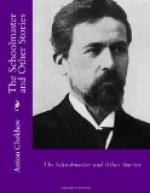Gelikonsky, the elementary schoolmaster, a young man with big pimples on his frightened face, wearing a new greatcoat like a sack, carries round wax candles on a silver-plated tray. The hostess, Lyubov Petrovna, stands in the front by a little table with a dish of funeral rice on it, and holds her handkerchief in readiness to her face. There is a profound stillness, broken from time to time by sighs. Everybody has a long, solemn face. . . .
The requiem service begins. The blue smoke curls up from the censer and plays in the slanting sunbeams, the lighted candles faintly splutter. The singing, at first harsh and deafening, soon becomes quiet and musical as the choir gradually adapt themselves to the acoustic conditions of the rooms. . . . The tunes are all mournful and sad. . . . The guests are gradually brought to a melancholy mood and grow pensive. Thoughts of the brevity of human life, of mutability, of worldly vanity stray through their brains. . . . They recall the deceased Zavzyatov, a thick-set, red-cheeked man who used to drink off a bottle of champagne at one gulp and smash looking-glasses with his forehead. And when they sing “With Thy Saints, O Lord,” and the sobs of their hostess are audible, the guests shift uneasily from one foot to the other. The more emotional begin to feel a tickling in their throat and about their eyelids. Marfutkin, the president of the Zemstvo, to stifle the unpleasant feeling, bends down to the police captain’s ear and whispers:
“I was at Ivan Fyodoritch’s yesterday. . . . Pyotr Petrovitch and I took all the tricks, playing no trumps. . . . Yes, indeed. . . . Olga Andreyevna was so exasperated that her false tooth fell out of her mouth.”
But at last the “Eternal Memory” is sung. Gelikonsky respectfully takes away the candles, and the memorial service is over. Thereupon there follows a momentary commotion; there is a changing of vestments and a thanksgiving service. After the thanksgiving, while Father Yevmeny is disrobing, the visitors rub their hands and cough, while their hostess tells some anecdote of the good-heartedness of the deceased Trifon Lvovitch.
“Pray come to lunch, friends,” she says, concluding her story with a sigh.
The visitors, trying not to push or tread on each other’s feet, hasten into the dining-room. . . . There the luncheon is awaiting them. The repast is so magnificent that the deacon Konkordiev thinks it his duty every year to fling up his hands as he looks at it and, shaking his head in amazement, say:
“Supernatural! It’s not so much like human fare, Father Yevmeny, as offerings to the gods.”
The lunch is certainly exceptional. Everything that the flora and fauna of the country can furnish is on the table, but the only thing supernatural about it, perhaps, is that on the table there is everything except . . . alcoholic beverages. Lyubov Petrovna has taken a vow never to have in her house cards or spirituous liquors —the two sources of her husband’s ruin. And the only bottles contain oil and vinegar, as though in mockery and chastisement of the guests who are to a man desperately fond of the bottle, and given to tippling.




